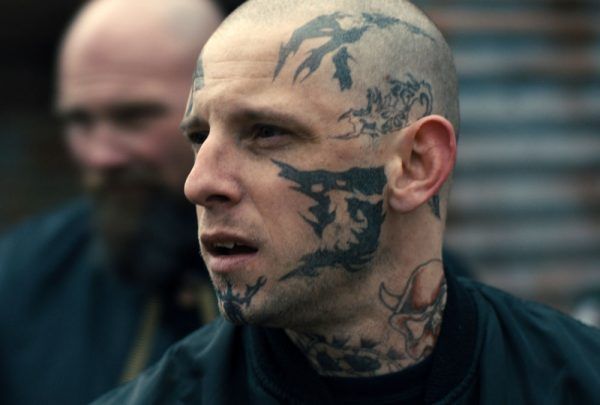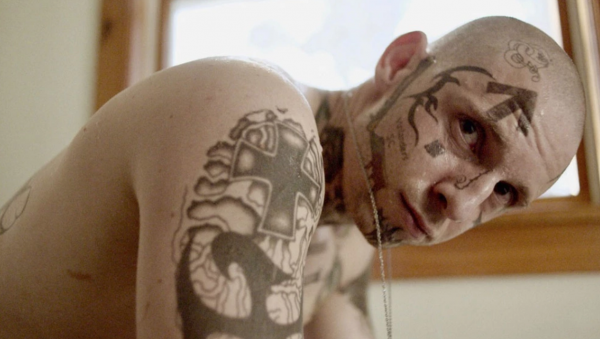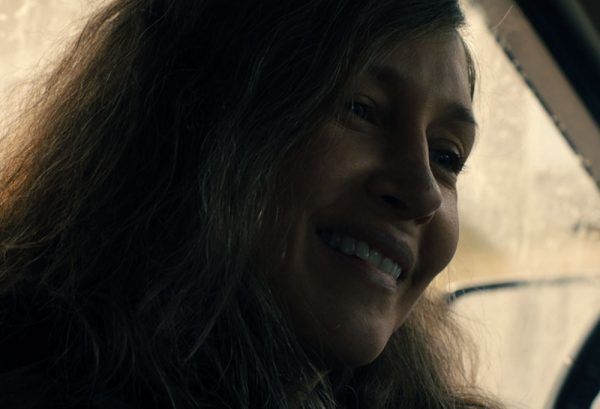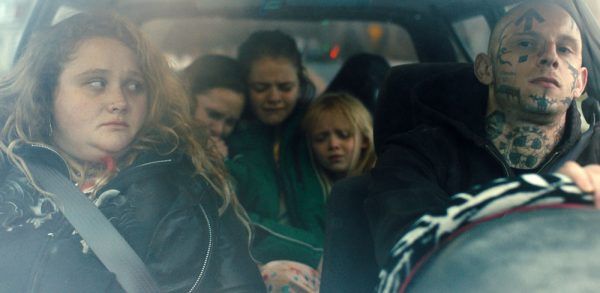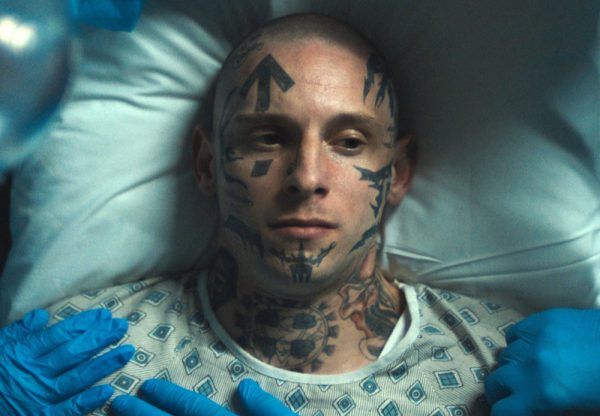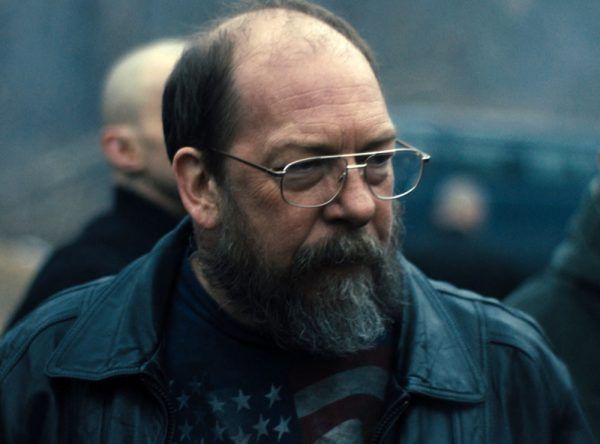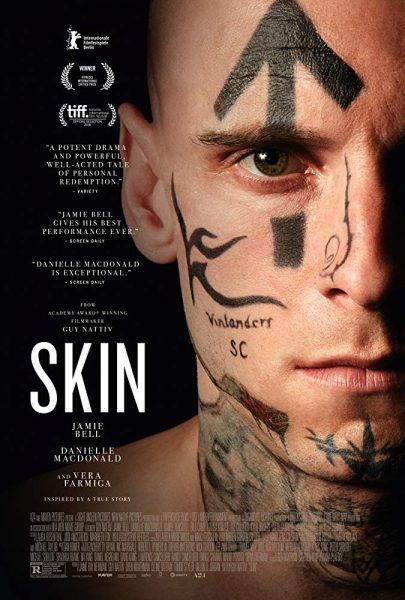From Israeli-born filmmaker Guy Nattiv, Skin is inspired by the true story of an American neo-Nazi skinhead named Bryon Widner (played in the film by Jamie Bell, who delivers a shocking and sometimes frightening performance), who abandons his life of hatred and violence, after becoming disillusioned with the lifestyle and mentality that accompany it. After a difficult childhood led him to a white supremacist gang, Bryon found himself dependent on a family that justified and encouraged the evil behavior he’d been a part of, over the years, only to later lead him to question whether he’s worthy of repenting for the damage that he wants to put a stop to.
During this 1-on-1 phone interview with Collider, British actor Jamie Bell talked about why he needed a bit of convincing to take this role on, not wanting to play this man as a redemptive hero, the process of applying so many tattoos, showing the extent of the pain that Bryon endured to have his tattoos removed, meeting the real man whose life inspired this film, working with Vera Farmiga, and being grateful that he went straight into playing Bernie Taupin in Rocketman, after Skin wrapped. He also talked about the battle in wanting to make films that don’t draw huge numbers at the box office, wanting to produce more projects, a developing desire to direct, and whether he’d consider doing another TV series.
Collider: I was thoroughly impressed with the incredible work that you did in this film. Your physical transformation and just everything, in general, was shocking and scary to watch.
JAMIE BELL: Thank you. Thank you for saying that.
This seems like a fascinating character to really get under the skin of, as an actor, but also really daunting, and I read that you were initially hesitant about taking it on. What most concerned you about the role, and what was it that really ultimately made you decide to do it?
BELL: Yeah, the character is so far away from where I am, as a human being. You’re reading scripts and you’re like, “Oh, that is an element that I can attribute to my own life and see some personal truth in that.” And then, that leads to the next one, and the next one. But with this, it was so polarizingly different from my own life and my own experience that I was really finding it difficult to draw from my own life. That was a challenge. But also, at the time this film came around, Trump was running for president, and these people and groups were certainly emboldened. They had suddenly become much more visible, overnight. They were on the front of newspapers and they were dominating the news cycles, and to me, it just didn’t feel like the movie that I wanted to make, or the story that I wanted to tell. Actually, the first time that I talked to Bryon [Widner] was the day of Charlottesville, and that had a tremendous affect on me, just seeing these people in broad daylight, armed to the teeth, and violent and aggressive. It just really made me incredibly hesitant, and I texted (writer/director) Guy [Nattiv] and said, “I don’t think we should be making this one.” He said, “That’s the point. We have to shine a light. We should shine a light.” There was a constant back and forth, and me telling him how I was gonna do this. I said, “I’m not playing a redemptive hero in this story. I’m not. I won’t play it that way.” And he was involved with that. We both had the same understanding that what’s more important is starting a conversation, shining a light, and leaving people with a question, which is, can people really escape themselves? Can people really escape what they’ve done, and can they, ultimately, change?
Often, change is internal, but with this, it’s also external. If this man is really going to change, he has to have all of those tattoos removed.
BELL: It’s true. I really admired how Guy had woven that into the narrative to tell the story. Each treatment is a new section of his life and metamorphosis, on a slightly deranged and masochistic level, so I really needed the character to go through physical pain. I hate to say that, but I really did need him to suffer. I needed him to go through that and to feel it, just as much as he dishes it out to unworthy people, in the early goings of the film. Basically, without that element in this film, I don’t think I would have made it. It was such an integral part of him coming to acceptance of who he is and what he’s done, and looking at himself in the mirror. It was just such an integral part of the movie.
You went from doing Film Stars Don’t Die in Liverpool, to playing this guy, to doing Rocketman. Was that a difficult transition, between those projects? Did you ever feel like you had actor whiplash, in any way?
BELL: Honestly, I was so grateful to be on the set of Rocketman because I did Rocketman after this. I was so grateful to just go and sing beautiful songs, be in wonderful colors, and frankly play a character like Bernie Taupin, who is so accepting of Elton John, and so accepting, warts and all, of him and his lifestyle. He couldn’t be more loyal, which was literally the antithesis of this character. So, it was honestly really a blessing and a relief, and a form of therapy for me. Because I remember Guy Nattiv, our filmmaker, texting me, “Congratulations on Rocketman.” And I texted back saying, “I need to do this movie, after what we’ve done.”
One of the things that really struck me about this story is the relationship that your character has with Ma, and how there’s this creepy sexuality that she uses to manipulate all of these people that she makes part of her family. What was it like to explore that relationship, and to find that dynamic with Vera Farmiga?
BELL: We were so lucky that we secured Vera Farmiga in that role. It just raised the bar of the movie, for everybody. She’s a phenomenal actress. I have to say, I was completely taken by surprise, by everything that she did. A bit of that was written, and I don’t take credit away from Guy, for creating a great character, but so much of it was invention from Vera, on the day, on the set, catching actors off guard. Much like when I worked with Annette Bening, people like that just turn up and they know exactly what they’re doing. They operate on a much different level. So, I loved being in scenes with her. They’re some of my favorite scenes of the film. She’s a creature. She’s like a wolf mother. I really thought she did something quite extraordinary with it. The relationship between him, Vera and Bill [Camp] is obviously a toxic one. It’s one that’s based on lies. It’s steeped in indoctrination, keeping him sick, in a way, and feeding him alcohol, giving him money, and telling him who to hit, so that the cycle continues. For Bryon, so much of the journey of the film is him coming to consciousness. It’s an awakening for him, and this separation from that family. It can be extremely difficult to do that.
How did you find the experience of talking to the real guy, picking his brain, and getting to know who he is? Did it help you, in understanding who this guy was?
BELL: I’ll never fully grasp him, as an individual. I really only spent a week, at most, with him. I was very honest, going into it. I said, “I find the things that you’ve done reprehensible. It’s going to be difficult for me, as an actor, to not hold this character in judgment, when I go to shoot it.” They tell you not to do that, and that you shouldn’t hold your characters in judgment because they are just human beings, after all, but it’s exceptionally difficult, when it comes to something like this. But, he was willing. He smoked a ton of cigarettes. He’s a very paranoid person. He’s a person who lives in constant fear. He’s a person who lives in eternal regret. He’s also a person who looks in the mirror and sees a gift that he’s been given by a complete stranger. Even that sense of kindness is almost a form of torture for him. The journey for him did not stop, once those tattoos came off. It’s still a journey for him, and he’s still walking it, and it’s a road that he has to walk alone. But, I’m grateful for his involvement. I’m very grateful for all of the pointers he gave me, and I’m grateful that we got to tell his story.
Once you saw yourself with the tattoos, and saw what that would look like and how you had changed, what was it like for you? Was that shocking?
BELL: Well, here’s the thing, we made the movie for absolute peanuts. I would say less than that. We made it for trail mix. And so, the budget only extended a certain way. When you have your lead actor in a chair for three and a half hours, to put tattoos on the face and arms, you’ve severely cut into your shooting day. If it was a scene where I had to have full body tattoos, that was five and half or six hours. It was just crazy. No one would ever, on this budget, try to do that. That would just be foolish. Fortunately, we had an amazing DP and very prepared actors. But here’s the thing, three-quarters of the way through, on a Friday, I was saying to my make-up artist, “God, it’s been such a long and taxing week. I can’t wait to just get back to the hotel, take a shower, and get this stuff off.” And he was like, “Yeah, about that . . .” I was like, “What do you mean?” He was like, “We’ve run out of money. We can’t print any more tattoos. You’re gonna have to wear them. You’re gonna have to keep them on.” And I was like, “You must be joking.” And he’s like, “No, we have one more set, which we need to keep fresh for the final week, so we can’t put it on you.” So, I was walking around Kingston, New York, dressed as Bryon, just sans contact lenses and teeth.
Do you have any idea what you’re going to do next?
BELL: Yeah, I have projects that I’m attached to. They’re all so different and small and character-driven, and just things that clearly are not working at the box office. So, I might never make a film again. I don’t know. It’s such a difficult landscape, these days. The work, for me, has to be rewarding, it has to be challenging, it has to invigorate me, and it has to be a real chunk of my life that I look back on and go, “That was really worth doing because you really tested yourself, and you really put yourself out there.” If it’s less than that, I can’t find a reason for doing it. So, it’s hard. It’s hard for everyone, at the moment, to know what the right thing to do is. But the scripts that I love, that I adore and that I’m attached to, hopefully will find the financing. Hopefully, there will be someone crazy enough to give us some money.
You also produced Teen Spirit, which came out earlier this year. Are you looking to produce more projects, as well?
BELL: Yeah. Me and Max Minghella have a company together, that’s called Blank Tape. That was our first movie, and we look forward to making more movies, hopefully with Fred Berger from Automatik, who produced Teen Spirit. We have a good relationship with him. We’re working on something right now. Max is an incredibly successful actor. He’s making a franchise movie right now (the next Saw film). Max is very hard to get on the phone, but hopefully, we’ll make something eventually.
After the experience that you had on Turn, would you consider doing another TV series and playing a character for a longer period of time, like that?
BELL: I’m not gonna lie, that was extremely challenging for me. The pace of it is so intense. I don’t know if it was just that show because we were dealing with period costumes, wigs, and livestock, horses, and all of the things that just make it so much more complicated, but I found that really, really testing, and really challenging. I had a great time, and the actors on it were amazing. We had such a lovely family on that, but I really like isolated pockets of work, where you disappear for six weeks and you dive into it. I also just love film. I love the darkened theater environment. I know that’s becoming less and less of a thing that people seem to enjoy together, but I do love that medium and that format. So, I would prefer working in that, but there’s amazing television and streaming, and all that stuff. But I wouldn’t say no, if it was good.
When you work with great filmmakers, like Guy Nattiv, or you see your friends doing it, have you thought about directing?
BELL: 100%. I cannot lie and say that, when I’m on set and we’re approaching a scene, that an instinct doesn’t kick in and say, “We’re doing this the wrong way.” It’s an instinct that keeps getting bigger and louder, and I’m finding it harder to suppress, so it’s just about being confident and taking that risk. I’m so proud of my friend, Max Minghella, who did it. He obviously comes from directing stock himself, and for him to step into those shoes is daunting, so I’m very proud of him. It’s a dream of mine, for sure, but I just don’t know if I’m that brave. Also, just the kinds of movies that I’d want to make are being so phased out, and becoming less and less commercially viable. As a filmmaker, you have to consider all of that stuff because you can spend years on a screenplay, trying to get something financed. I’ve seen that side of it now, too, and it’s really daunting. You really have to believe in something. I’m a big fan of Robert Pattinson. I think what he’s done is actually quite phenomenal. He’s getting the credit that is his due now, but he was doing those really off the wall Cronenberg movies, and going to work with some really fascinating filmmakers. I saw Good Time in the theater, and I was blown away by the investment of the actors and the storytelling, and how fresh it was. I just hope films like that – these smaller, character-driven films – don’t die because I’ll be out of a job, but I also really enjoy them and am blown away by them. I just hope that we’ll continue making them.
Skin is in theaters and on-demand on July 26th.


